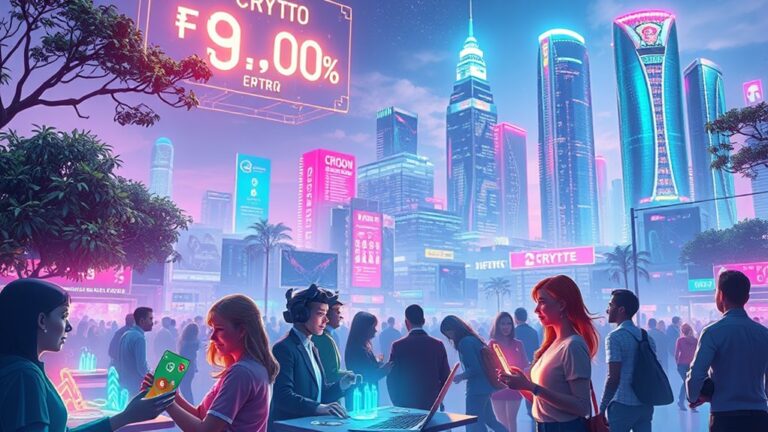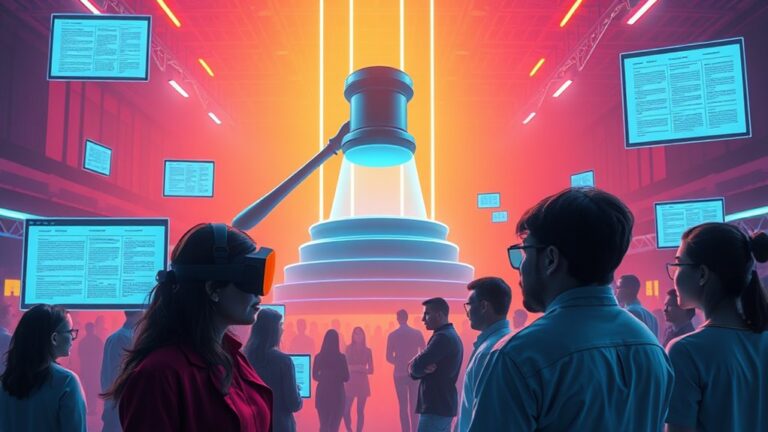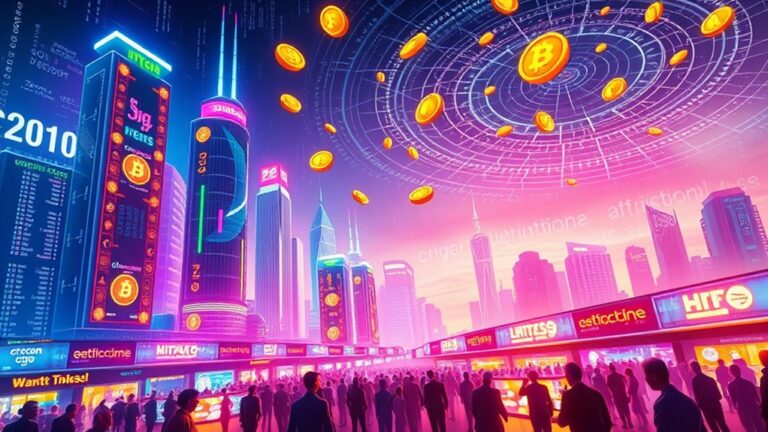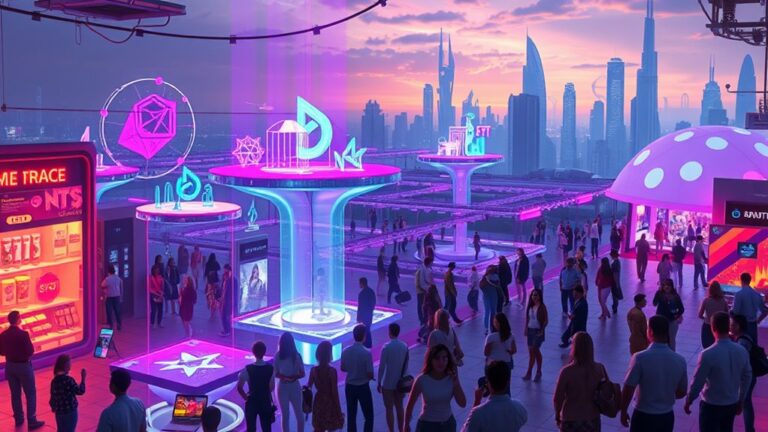
Virtual Land in the Metaverse: A New Era of Digital Ownership?
Virtual land in the metaverse symbolizes a new era of digital ownership, enabling users to buy, sell, and develop virtual spaces through non-fungible tokens (NFTs). These digital assets guarantee proof of ownership, facilitating a decentralized economy. The value of virtual land depends on factors such as scarcity, location, and utility. While investment opportunities arise, challenges like regulatory uncertainty and cybersecurity risks must be considered. Understanding these elements can reveal the potential and complexities of this emerging market further.
Key Takeaways
- Virtual land in the metaverse is uniquely owned through NFTs, providing proof of ownership and facilitating decentralized transactions.
- Ownership of virtual land allows users to create, develop, and monetize digital spaces, similar to traditional real estate.
- The market for virtual land is projected to grow significantly, offering investment opportunities and potential capital appreciation.
- Regulatory uncertainty and cybersecurity risks pose challenges for virtual land ownership, necessitating clear legal frameworks and security measures.
- Emerging technologies like VR, AR, and blockchain will continue to shape the future of virtual land and enhance user experiences in the metaverse.
Understanding Virtual Land and Its Value

Understanding virtual land and its value requires a grasp of its definition and the unique characteristics that set it apart from traditional real estate.
Virtual land is fundamentally a digital space within virtual environments, such as online games or virtual reality platforms. It is often represented as a non-fungible token (NFT), ensuring exclusive ownership. Users can utilize this land for various purposes, including constructing virtual homes, hosting events, or creating businesses.
The value of virtual land is influenced by factors such as scarcity, utility, and location within the metaverse. Additionally, ownership is governed by platform-specific rules, making comprehension of these regulations vital for potential investors and users alike.
Understanding these elements is significant for maneuvering this innovative digital landscape.
Key Platforms for Virtual Land Acquisition
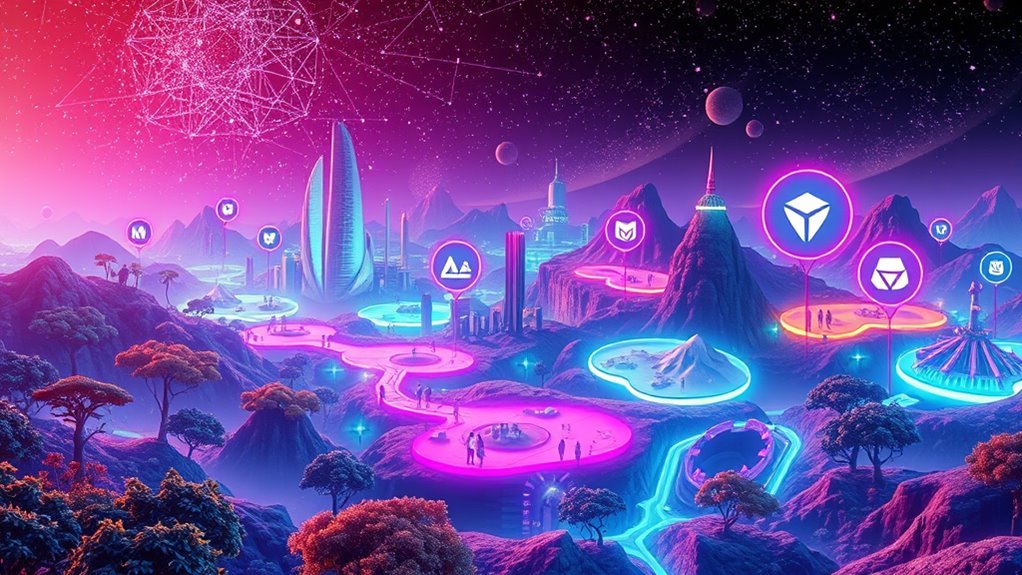
The landscape of virtual land acquisition is shaped by several prominent platforms, each offering unique features and opportunities for users.
Decentraland allows for the purchase and development of over 90,000 plots, hosting events like Metaverse Fashion Week.
Decentraland offers over 90,000 plots for purchase and development, featuring events like Metaverse Fashion Week.
The Sandbox focuses on gaming and creativity, attracting significant corporate investments.
Somnium Space offers a virtual reality environment where users can develop land, while CryptoVoxels provides a user-owned space with land tokenization.
Upland differentiates itself by linking virtual properties to real-world addresses, making entry more affordable.
Each platform utilizes different transaction methods, primarily through Ethereum or native tokens, catering to diverse user preferences in the growing metaverse real estate market.
The competition among these platforms fosters innovation and engagement within virtual communities.
The Role of NFTs in Digital Ownership
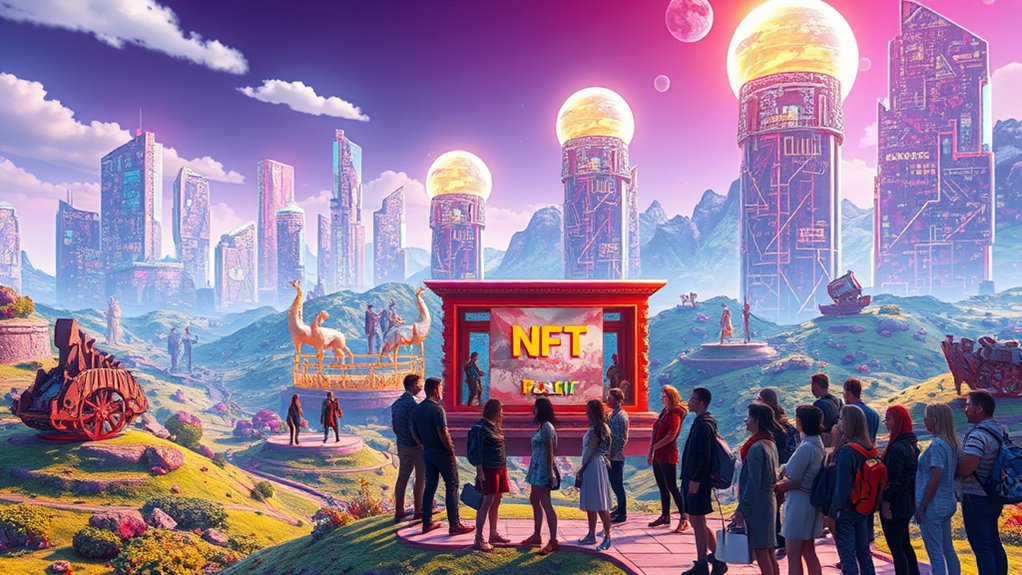
As the digital landscape continues to evolve, NFTs (non-fungible tokens) have emerged as essential components in establishing digital ownership within the metaverse.
These unique digital tokens are stored on a blockchain, providing proof of ownership for various virtual assets. By leveraging blockchain technology, NFTs guarantee tamper-resistant and transparent transactions.
Each NFT represents a distinct asset, making them ideal for digital art, music, and virtual real estate. They facilitate a decentralized economy, allowing users to buy, sell, and trade digital goods seamlessly.
Additionally, NFTs enable customization options for avatars and gaming assets, while fostering community building through exclusive experiences. As legal recognition of NFTs grows, they are increasingly viewed as property, offering owners potential proprietary rights. Furthermore, the blockchain ensures security, transparency, and immutability, making NFTs valuable for proving ownership and authenticity in various digital and real-world applications.
Economic Implications of Virtual Real Estate

The economic implications of virtual real estate are becoming increasingly significant as the metaverse expands.
Investment opportunities arise from various revenue generation methods, such as renting properties and hosting events, which can attract a growing user base.
Understanding market dynamics is essential, as fluctuations in demand and technology can profoundly impact the value and potential returns of virtual land investments.
Investment Opportunities Overview
Investment opportunities in virtual real estate have gained notable attention as the metaverse continues to expand. The market has seen significant growth since 2021, driven by an increase in user engagement and platform development.
Investors are drawn to virtual properties for their potential capital appreciation, which can mirror traditional real estate investment returns. Additionally, digital land offers diversification benefits, as its performance often differs from conventional real estate markets.
High-profile ownership can elevate property values due to perceived prestige, while the leading platforms, such as The Sandbox and Decentraland, facilitate transactions.
However, investors should remain aware of the market’s volatility and inherent risks, including technological dependencies and regulatory uncertainties that may impact long-term investment stability.
Revenue Generation Methods
Revenue generation in virtual real estate encompasses various methods that allow landowners to maximize their investments. Key strategies include renting and leasing properties, hosting events, developing new structures, and engaging in digital asset creation. Each method provides unique advantages, enabling owners to cultivate diverse income streams.
| Method | Description |
|---|---|
| Renting and Leasing | Consistent income from long-term tenants. |
| Hosting Events | Earnings from concerts and product launches. |
| Property Development | Increased value through unique structures. |
| Digital Asset Creation | Income from NFTs and virtual services. |
Market Dynamics Analysis
As the metaverse continues to evolve, understanding the economic implications of virtual real estate becomes increasingly important.
The metaverse real estate market is projected to grow from $4.12 billion in 2025 to approximately $67.40 billion by 2034, highlighting a compound annual growth rate (CAGR) of 36.55%. This growth reflects rising interest in the metaverse as a digital space, with over 2.6 billion users expected by 2030.
However, the market is susceptible to significant price fluctuations driven by speculation and technological changes. Investors must navigate potential volatility and regulatory challenges.
Additionally, virtual real estate offers diversification opportunities but is highly dependent on technological advancements, affecting its long-term value and utility in the broader economy.
Challenges and Risks in the Virtual Land Market

The virtual land market in the Metaverse faces significant challenges and risks that potential investors must consider.
Regulatory uncertainty can complicate ownership rights and create disputes, while security vulnerabilities expose users to scams and data breaches.
Additionally, conflicts over property ownership may arise due to the lack of established legal frameworks, further complicating the landscape for virtual real estate transactions.
Regulatory Uncertainty Issues
While traversing the emerging market for virtual land in the metaverse, participants face significant regulatory uncertainty that complicates transactions and investments.
The lack of clear regulations creates confusion, as existing property laws do not easily apply to these digital assets. Jurisdictional issues arise because transactions often span multiple countries, making it hard to determine which laws govern them.
Additionally, the absence of a central authority overseeing these transactions further complicates matters. Smart contracts, which are intended to facilitate agreements, often come with ambiguous terms, leading to disputes over ownership.
Data protection regulations also present challenges for platforms managing user information, necessitating the need for new legal frameworks tailored to the unique characteristics of the virtual land market.
Security Vulnerabilities and Risks
Maneuvering the virtual land market involves not only regulatory challenges but also significant security vulnerabilities and risks. The Metaverse, with its reliance on advanced technologies, presents various threats such as data interception and identity spoofing. Users face the danger of scams, malware, and ransomware that can compromise both their assets and personal information. Additionally, the lack of regulation and the complexity of decentralized platforms further amplify these risks. Understanding the security measures that can be implemented to protect assets is crucial in navigating this evolving landscape.
| Risk Type | Description |
|---|---|
| Cybersecurity Threats | Attacks on data privacy and location information |
| Digital Identity Risks | Fraudulent transactions and unauthorized access |
| Data Interception | Vulnerability to interception by malicious actors |
| Malware Concerns | Financial losses from specialized malware |
| Scams and Phishing | Exploitation of newcomers through deceptive tactics |
Ownership Disputes and Conflicts
Ownership disputes and conflicts in the virtual land market pose significant challenges for users and investors alike. The legal status of virtual land remains largely undefined, often governed by platform-specific terms rather than traditional property laws.
While Non-Fungible Tokens (NFTs) can secure ownership records, they do not clarify legal rights, leading to confusion. Jurisdictional issues complicate conflict resolution as disputes may cross multiple legal boundaries.
Furthermore, innovative dispute resolution methods, like arbitration, are still being developed. The complexity of property rights in the metaverse further complicates matters, as ownership can often be viewed as a license rather than true ownership.
As the market evolves, a standardized legal framework will be necessary to address these challenges effectively.
Future Trends and Opportunities in the Metaverse

The metaverse is poised for significant growth, driven by emerging trends and technological advancements that promise to reshape digital interactions.
Key technologies, such as next-generation VR and AR, will enhance immersive experiences, while blockchain integration fosters decentralized economies and user ownership.
AI-enhanced avatars will facilitate personalized interactions, supported by sensory feedback systems that create realistic environments.
Social-first platforms will promote engagement through real-time collaboration tools and virtual events, strengthening community connections.
Economic opportunities abound in the virtual real estate market and monetization strategies like renting properties and trading NFTs.
However, challenges such as cybersecurity concerns, interoperability issues, and regulatory frameworks must be addressed to guarantee sustainable growth and widespread adoption of the metaverse. Moreover, the integration of cryptocurrencies for secure transactions is essential for building trust in these new virtual economies.
Frequently Asked Questions
Can I Develop a Business on My Virtual Land?
One can indeed develop a business on virtual land, utilizing various strategies such as hosting events, renting space, or creating branded experiences, thereby capitalizing on the growing opportunities within the metaverse’s digital landscape.
How Do I Determine the Value of My Virtual Property?
Determining the value of virtual property resembles unearthing a hidden gem; factors like scarcity, utility, community engagement, and market dynamics intertwine. Investors assess these elements, revealing the intricate tapestry that defines a property’s worth.
Are There Taxes on Virtual Land Ownership?
Taxes on virtual land ownership include income tax on rental earnings and capital gains tax upon sale, similar to physical properties. However, complexities arise due to jurisdictional ambiguities and evolving regulations in the digital asset landscape.
What Happens if a Platform Shuts Down?
When a platform gracefully closes its doors, users may face uncertainty regarding asset ownership, potential data loss, and the need to navigate alternative spaces, all while the community and economic landscape undergo significant transformation.
Can Virtual Land Be Inherited or Transferred?
Virtual land can be inherited or transferred through blockchain-based systems, utilizing NFTs for ownership proof. However, the absence of unified legal frameworks complicates these processes, necessitating new structures for effective management and transfer of digital assets.
Conclusion
To sum up, virtual land in the metaverse presents a fascinating yet perplexing concept of ownership. As individuals invest in pixelated parcels, one must ponder the value of such digital spaces. Will these virtual properties become the new beachfronts, or are they merely a whimsical trend? As technology evolves, it is essential to recognize the potential benefits and pitfalls of this digital frontier. Ultimately, the future may reveal whether virtual land is a wise investment or just a mirage in cyberspace.




